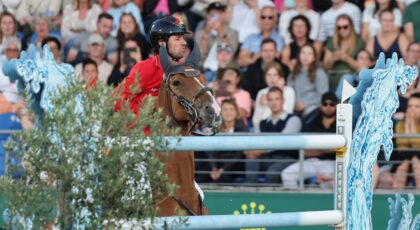A: As a trainer, this is a delicate subject.
I try my very, very best to make sure when a horse needs to be retired, they get exactly what is best for them. Saying that, there are so many emotions involved.
Usually, if you listen well to your horse, you will just know. It’s our job, as trainers, to listen closely, and I take this very seriously. It’s not age or miles that always tell you when a horse is ready to step back—sometimes it’s just time.
In other words, there’s no simple equation that gets your horse to retirement, it’s a feeling about what is right for them—this one doesn’t have a 2+2=4 answer! As a trainer, I make sure the owner respects my decision and understands; owners aren’t always the ones that live day-in and day-out with their horse and see the things I see.
It’s up to me, as the trainer, to advocate for all of my horses, and I make sure I am paying attention to the ‘whole horse’ daily. I also think long and hard about the best type of retirement for a particular situation, and I try to make a plan for the owner and the horse that fits them both.
It is our job, as trainers, to not only coach in the ring, but do what is best—every day—for each horse in our program. If and when that includes finding a new retirement home or lowering the level of a horse’s job, that is our responsibility.
As a judge, I see so many in the ring that might cause me think, “It’s time for retirement.” However, I don’t know the horse, nor the background of events that have led to that moment when the horse is in front of me. I can preach, as a judge, that a particular horse “looks done,” but truly, I don’t know, when I’m in the box, if it is time. It’s like I always tell people—KNOW YOUR HORSE!
As a mom, however, I just know. The horse might give me a look—something like a human nod—a, “Mom, I need time…” Sometimes it’s just a brief time-out required for a particular horse. Then, because I see them daily, they tell me down the road if it’s a ‘forever’ length of time, or a, ‘I’ll-be-ready-to-play-again-after-a-break,’ length of time.
As a mom, I have had a few of these kinds of horses, and it is a hard place to be in, as you must do whatever they need. I make sure I am listening to my horses, and I’ll literally talk to them—sometimes over days or months—until I know. And when I do have that “gut” answer, I listen to it!
I owe everything to my horses, as they have done so much for me. I make sure, when it’s not quite time, that I give them what they’re asking for—maybe a lower-level job, or fewer horse shows—whatever it may be. And when it is time for them to call it quits for good, they get the best life I can give them: A friend if they want one, no friends if they don’t want them, lots of love.
Then, when they can’t live as a horse and be happy and comfortable anymore, I make that next hard decision. Each horse is oh-so different, and it is our responsibility, as mothers, to do what is right for them.
Dana Hart-Callanan is a successful hunter, jumper and equitation coach, an ‘R’ judge, and a sales broker. In this column, she answers common questions about A-level sport. Send your questions to news@horsenetwork.com for consideration in a future column.


 June 24, 2024
June 24, 2024 

























